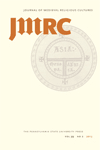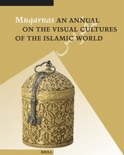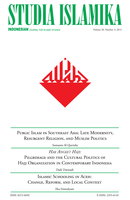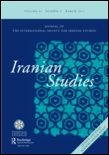
Islamic Africa
Scope & Guideline
Illuminating Interdisciplinary Insights into Africa's Islamic Heritage
Introduction
Aims and Scopes
- Exploration of 'Ajami Literature:
The journal prominently features studies on 'Ajami literature, which refers to the use of Arabic script to write African languages. This includes discussions on the typographic challenges, historical significance, and cultural contributions of 'Ajami texts across various African communities. - Religious Minorities and Interfaith Dynamics:
A core area of focus is the examination of religious minorities within predominantly Muslim contexts. This includes the study of communities such as the Ahmadis and Shia Muslims, exploring their social dynamics, political engagement, and the challenges they face in diverse African settings. - Cultural Expressions of Islam:
The journal highlights the artistic and cultural expressions of Islam in Africa, including poetry, proverbs, and local metaphors. These studies delve into how spirituality is articulated in specific cultural contexts, enriching the understanding of Islamic practices and beliefs. - Historical Contextualization of Islamic Practices:
The journal also emphasizes historical analyses of Islamic practices in Africa, tracing the evolution of religious and cultural identities through time. This includes the study of significant historical texts and manuscripts, as well as the impact of colonialism and globalization on Muslim communities. - Socio-Political Engagement:
The intersection of Islam with socio-political issues is another critical area, encompassing discussions on Islamic leadership, community resilience, and the role of Islam in political movements across various African nations.
Trending and Emerging
- Digitalization and 'Ajami Literature:
The intersection of technology and 'Ajami literature is gaining traction, as evidenced by studies examining the challenges and opportunities presented by digital environments. This theme is particularly relevant in addressing how traditional literacies adapt to modern technological contexts. - Migration and Transnational Muslim Identities:
Research focusing on the experiences of Muslim migrants, particularly in the context of Europe, is increasingly prevalent. This reflects a broader interest in understanding how migration shapes religious identities and community dynamics in both origin and host countries. - Local vs. Global Islamic Practices:
There is a growing emphasis on the tension and interplay between local traditions and global Islamic movements. This theme explores how African Muslims navigate their identities amidst global influences, showcasing the diversity of thought and practice within the continent. - Cultural Resilience and Spirituality:
Recent studies underscore the importance of cultural resilience and local expressions of spirituality, particularly in the face of socio-political challenges. This trend highlights the significance of traditional practices and beliefs in maintaining community cohesion.
Declining or Waning
- Traditional Gender Studies:
The exploration of gender issues within traditional frameworks appears to be less frequent, possibly overshadowed by more contemporary discussions on gender dynamics influenced by modernity and globalization. - Colonial Legacies in Islamic Studies:
Research explicitly focused on colonial legacies and their impacts on Islamic practices and communities in Africa seems to be less emphasized, as scholars may be shifting towards examining contemporary issues and local agency. - Studies on Islamic Legal Systems in Isolation:
There is a noticeable decline in papers focused solely on Islamic legal systems without the integration of broader socio-cultural contexts. This shift indicates a move towards more holistic approaches that consider multiple factors influencing Islamic law.
Similar Journals

Al-Shajarah
Illuminating the Intersection of History, Philosophy, and IslamAl-Shajarah is an esteemed academic journal that serves as a vital platform for scholarly discourse in the fields of Cultural Studies, History, Philosophy, and Religious Studies. Published by the International Islamic University Malaysia and the International Institute of Islamic Thought and Civilization, the journal reflects a profound commitment to advancing understanding and dialogue surrounding Islamic thought and its place in modern society. With an ISSN of 1394-6870 and an evolving publication history since its convergence in 2011, Al-Shajarah offers valuable insights that cater to a broad array of readers, from seasoned researchers to emerging academics. The journal's rigorous peer-review process and commitment to cultural and religious scholarship are underscored by its categorization in the Q3 and Q4 quartiles in critical academic fields, and its Scopus rankings demonstrate its relevance within the global academic landscape. While open access is not currently available, Al-Shajarah remains a crucial resource for those seeking to enrich their understanding of Islamic civilizations and philosophy, providing access to pioneering research that shapes the conversation within these disciplines.

Journal of Al-Tamaddun
Elevating Scholarly Discourse on Islamic CivilizationWelcome to the Journal of Al-Tamaddun, an esteemed academic publication dedicated to the exploration of Islamic history, culture, and anthropology. Published by UNIV MALAYA, ACAD ISLAMIC STUDIES, this open-access journal has been contributing to scholarly discourse since 2008, allowing comprehensive and unrestricted access to its rich array of research articles. The journal proudly ranks in the upper quartiles of several categories for 2023, including Q1 in History and Religious Studies and Q2 in Anthropology and Cultural Studies, reflecting its significant impact and relevance in these fields. Hailing from Malaysia, the journal serves as a global platform for researchers and scholars, fostering interdisciplinary dialogue and enhancing our understanding of civilization through a critical Islamic perspective. With its Scopus rankings highlighting its standing within arts and humanities, the Journal of Al-Tamaddun aims to propel innovative research and contribute to the development of knowledge across diverse academic landscapes.

Journal of Islamic Manuscripts
Celebrating the Artistry of Islamic HeritageJournal of Islamic Manuscripts is a prestigious academic journal published by BRILL, dedicated to the study and preservation of Islamic manuscripts from their historical, cultural, and artistic perspectives. With an ISSN of 1878-4631 and an E-ISSN of 1878-464X, this journal serves as a vital platform for researchers, professionals, and students interested in Cultural Studies, Visual Arts, and Performing Arts. Housed in the Netherlands, the journal boasts a commendable rank within Scopus, showcasing its significant impact within its fields—ranking #229 in Visual Arts and Performing Arts and #690 in Cultural Studies for 2023. Operating under a traditional subscription model, the journal ensures its contributions are accessible to a global audience dedicated to furthering the understanding of Islamic art and heritage. Spanning from its inception in 2010 through 2024, the journal promises to continue enhancing knowledge and appreciation of the diverse narratives encapsulated in Islamic manuscripts.

Al-Jamiah-Journal of Islamic Studies
Advancing Knowledge in Islamic StudiesAl-Jamiah: Journal of Islamic Studies is a distinguished scholarly journal published by Sunan Kalijaga State Islamic University in Indonesia. Established as an Open Access publication since 2005, it aims to foster the dissemination of knowledge in the field of Islamic studies, catering to a diverse audience of researchers, professionals, and students interested in the rich tapestry of Islamic culture, religion, and thought. With an impressive Q1 ranking in Religious Studies and a Q2 ranking in Arts and Humanities for 2023, the journal stands out as a vital resource with high visibility and impact, holding a prestigious position in Scopus ranks—40th out of 644 in Religious Studies and 12th out of 173 in General Arts and Humanities. Al-Jamiah's commitment to academic excellence is reflected in its rigorous peer-review process, ensuring the publication of high-quality research. Based in Yogyakarta, Indonesia, the journal welcomes contributions that explore innovative perspectives and interdisciplinary approaches to contemporary issues affecting the Islamic world.

Journal of Medieval Religious Cultures
Illuminating History: The Intersection of Faith and SocietyJournal of Medieval Religious Cultures, published by Penn State University Press, stands as a vital resource for scholars in the fields of History and Religious Studies. With its ISSN 1947-6566 and E-ISSN 2153-9650, this journal provides a platform for high-quality research focused on the intersections of religion, culture, and society during the medieval period. Its current impact factor underscores its relevance and citation frequency in academic circles, solidifying its position in the Q3 quartile for both categories as of 2023. The journal's commitment to fostering scholarly dialogue makes it an essential read for researchers, professionals, and students alike, exploring topics that shape our understanding of medieval religious practices and beliefs. Although it does not offer open access, the journal ensures that its contributions are accessible through various academic libraries, facilitating valuable insights into a pivotal era of history. Explore the latest findings and engage with leading scholarship published from 2014 to 2024 at Penn State University Press.

Muqarnas-An Annual on the Visual Cultures of the Islamic World
Fostering Dialogue on Visual Cultures Across TimeMuqarnas: An Annual on the Visual Cultures of the Islamic World, published by BRILL, stands as a seminal contribution to the academic discourse surrounding the visual cultures intrinsic to Islamic societies. With its ISSN 0732-2992 and E-ISSN 2211-8993, this prestigious journal, based in the Netherlands, has been a vital resource for scholars since its inception in 1985. Specializing in the intersection of Cultural Studies, History, and Visual Arts, Muqarnas is recognized as a Q1 journal in Visual Arts and Performing Arts and maintains strong positions in other academic categories, underscored by impressive Scopus rankings. Offering a deep exploration of visual traditions and practices, the journal fosters a broader understanding of Islamic art and architecture's historical contexts, contributing significantly to its field. With its rigorous peer-review process and commitment to scholarly excellence, Muqarnas invites researchers, professionals, and students to engage with the rich tapestry of Islamic visual culture, ensuring its relevance and importance for contemporary scholarship.

Studia Islamika
Pioneering research in the realm of Islamic studies.Studia Islamika is a distinguished academic journal published by the Syarif Hidayatullah State Islamic University Jakarta, specifically through the Center for Study Islamic & Society. Established in 1994, this journal has rapidly evolved to become a pivotal platform for advancing scholarly dialogue in the field of Islamic Studies. With a notable impact factor and categorized in the prestigious Q2 quartile of Religious Studies as of 2023, it emphasizes the critical examination of Islamic thought, culture, and sociopolitical contexts. The journal's issues span from 1994 to present, featuring innovative research that engages with contemporary challenges in Muslim societies. Although it does not currently offer open access, its rigorous peer-review process ensures high-quality research contributions. Researchers, professionals, and students alike will find Studia Islamika to be an invaluable resource for enhancing their understanding of the multifaceted dynamics within Islamic traditions and their implications in today's world.

Iranian Studies
Pioneering Research in the Heart of Iranian HumanitiesIranian Studies is a prestigious academic journal published by Cambridge University Press, focusing on the intricate and diverse aspects of Iranian culture, history, and literature. With an impressive impact factor reflected in its Q1 and Q2 quartile rankings across several categories, including Literature and Literary Theory, History, and Cultural Studies, the journal stands as a vital resource for scholars dedicated to advancing their understanding of Iranian studies. Since its inception in 1967, it has provided a platform for rigorous research and critical discourse, making significant contributions to the fields of Iranian cultural and historical studies. Although the journal is not open access, it ensures quality and rigor in academic publishing, appealing to a wide array of readers, including researchers, professionals, and students seeking authoritative insights. With coverage available until 2024, Iranian Studies remains an essential point of reference and a source of innovative scholarship in the humanities.

International Journal of Islamic Thought
Connecting Local Insights with Global Perspectives in Islamic ThoughtInternational Journal of Islamic Thought is a leading scholarly publication, dedicated to advancing knowledge and understanding in the fields of Islamic studies. Published by UNIV KEBANGSAAN MALAYSIA, FAC SCIENCE & TECHNOLOGY, this journal is positioned as an essential resource for researchers, professionals, and students alike, striving to explore and disseminate contemporary thoughts and interpretations within the Islamic intellectual tradition. With an impact factor indicative of its quality—ranking Q2 in Arts and Humanities and Q3 in Social Sciences as of 2023—the journal provides a robust platform for interdisciplinary discourse. Since its inception, the journal has embraced an open access model, ensuring that research is readily available to a global audience, thereby fostering further inquiry and collaboration. Hailing from Malaysia, the journal's commitment to contributing to both the local and international scholarly communities is underscored by its impressive standing in the Scopus rankings, reflecting its growing influence and reach in the academic landscape.

Nazariyat-Journal for the History of Islamic Philosophy and Sciences
Connecting Past Insights with Present UnderstandingNazariyat-Journal for the History of Islamic Philosophy and Sciences, published by SCIENTIFIC STUDIES ASSOCIATION, is a leading academic journal dedicated to the exploration and dissemination of research in the history of Islamic philosophy and sciences. With an ISSN of 2528-8563 and E-ISSN 2547-9415, this journal has adopted an Open Access model since 2014, ensuring that valuable insights and scholarly work are readily available to a global audience. Situated in Istanbul, Turkiye, the journal serves as a vital platform for researchers, students, and professionals seeking to deepen their understanding of the rich intellectual traditions of Islamic thought. Although the HIndex is currently unavailable, the journal is committed to upholding rigorous academic standards while encouraging interdisciplinary dialogue. By bridging historical examination with contemporary relevance, Nazariyat plays an essential role in fostering a nuanced appreciation of Islamic intellectual heritage within the broader scientific community.